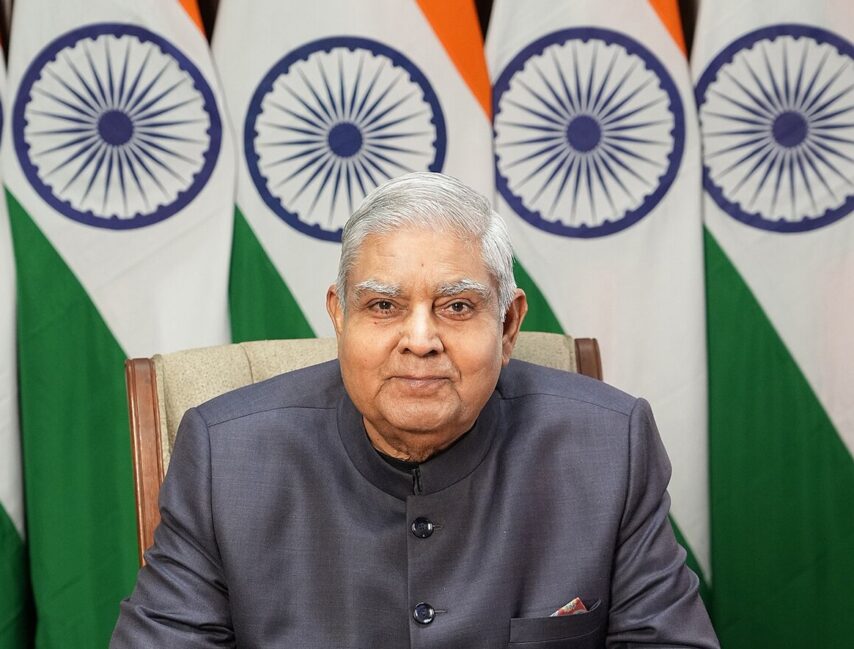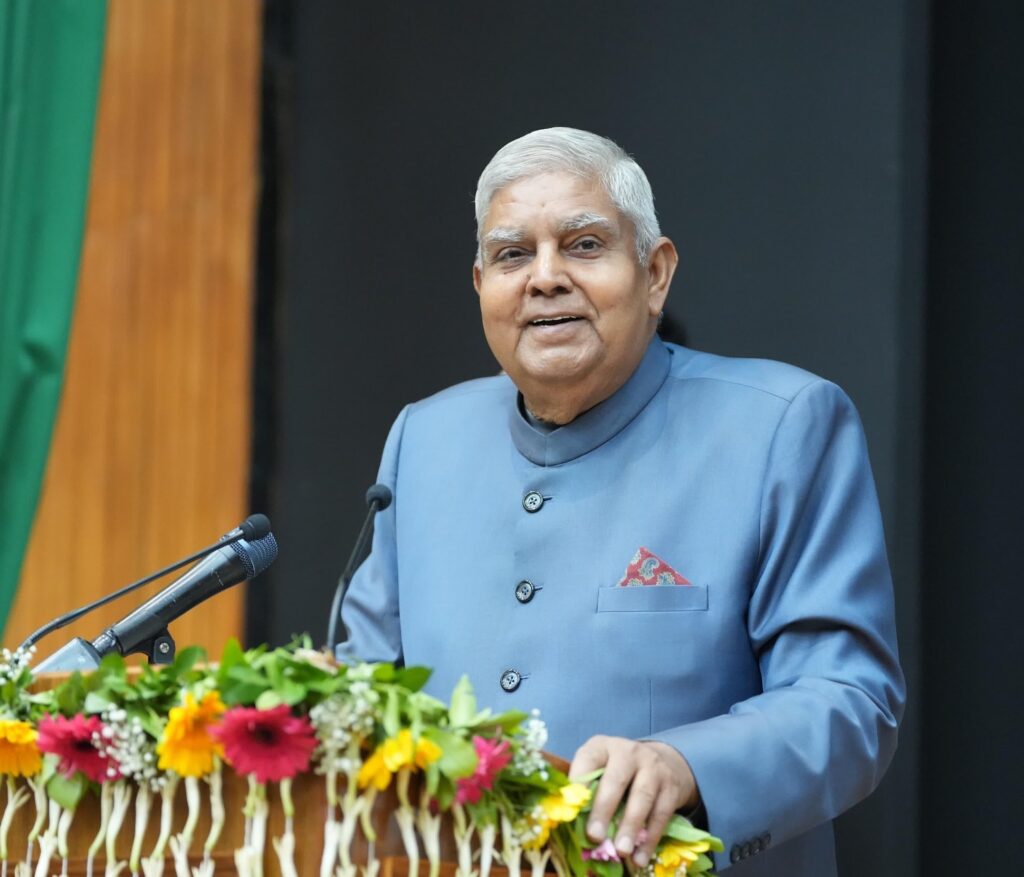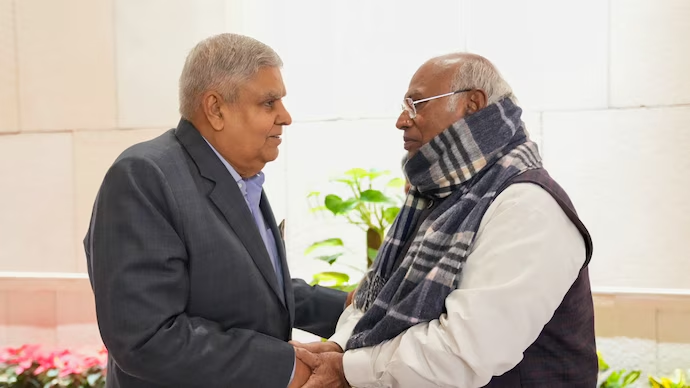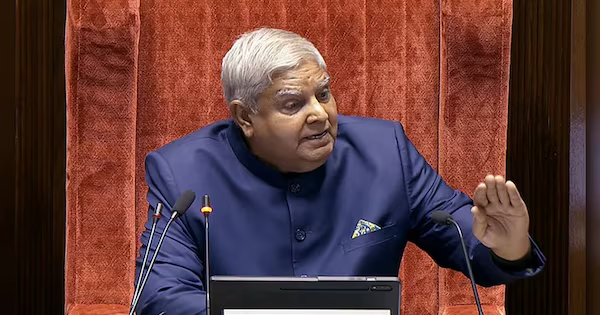
Vice President Jagdeep Dhankhar’s sudden resignation on July 21, 2025, sent shockwaves through India’s political establishment and marked a defining moment in the country’s constitutional history. His unexpected departure from the nation’s second-highest office, citing health concerns, has triggered intense speculation about the deeper reasons behind this unprecedented move.
The Dramatic Exit
On the evening of July 21, just hours after presiding over the first day of Parliament’s Monsoon Session, Dhankhar submitted his resignation to President Droupadi Murmu with immediate effect. In his letter, he stated: “To prioritise health care and abide by medical advice, I hereby resign as Vice President of India, effective immediately, in accordance with Article 67(a) of the Constitution”.
The 74-year-old’s decision came as a complete surprise to the political establishment. President Murmu formally accepted the resignation on July 22, with the Ministry of Home Affairs issuing a notification confirming its immediate effect.
A Day of Unprecedented Developments
Dhankhar’s final day as Vice President was marked by significant parliamentary proceedings that may have contributed to his dramatic exit. During his last sitting as Rajya Sabha Chairman, he made several crucial announcements, including the acceptance of an impeachment motion against Delhi High Court judge Justice Yashwant Varma. This motion, signed by over 50 opposition MPs, sought the judge’s removal in connection with the controversial cash recovery case from his residence earlier in the year.
Hours before his resignation, Dhankhar had urged parliamentarians to reduce political acrimony, stating: “A thriving democracy cannot sustain constant acrimony. Political tension must be reduced, as confrontation is not the essence of politics”. Ironically, these words would prove to be his final public plea as the nation’s constitutional head.
The timing raised eyebrows particularly because his office had announced a scheduled trip to Jaipur just hours before the resignation. This sudden change of plans added to the mystery surrounding his departure.
Health Concerns: The Official Narrative
The official reason for Dhankhar’s resignation centered on his deteriorating health condition. The Vice President had undergone angioplasty at the All India Institute of Medical Sciences (AIIMS) in Delhi in March 2025, following a heart attack. He was admitted on March 9 and discharged on March 12 after the procedure, with doctors advising him to take adequate rest.
Recent reports revealed that Dhankhar had collapsed during an official event in Delhi on July 17, just four days before his resignation. The incident occurred while he was visiting a garden with his wife and Delhi Lieutenant Governor VK Saxena, requiring urgent medical assistance. Additionally, he had suffered another health scare during an official visit to Nainital in June, where he required first aid from local doctors.
His visible frailty had become apparent in recent public appearances, with the Vice President often delivering speeches while seated rather than standing. These health issues lent credibility to the official explanation for his departure.
Political Undercurrents and Speculation
Despite the official health-related explanation, political observers and opposition leaders have suggested deeper reasons behind Dhankhar’s sudden exit. The most significant theory relates to his handling of the judicial impeachment motions on his final day in office.
The Justice Varma Controversy
The impeachment motion against Justice Yashwant Varma had become a politically sensitive issue. The judge was embroiled in controversy following the alleged recovery of a large amount of cash from his Delhi residence during a fire incident in March 2025. The Supreme Court had established a three-judge inquiry committee that found “strong inferential evidence” against Justice Varma and recommended impeachment proceedings.
The government had initially planned to introduce the impeachment motion only in the Lok Sabha, with Parliamentary Affairs Minister Kiren Rijiju coordinating the process. However, Dhankhar’s acceptance of a parallel motion in the Rajya Sabha may have disrupted this strategy, as constitutional provisions require joint proceedings when motions are filed in both houses simultaneously.
Tensions with the Government

Reports emerged of significant tensions between Dhankhar and senior government ministers. Congress leader Jairam Ramesh revealed that Union ministers JP Nadda and Kiren Rijiju had failed to attend a crucial Business Advisory Committee meeting chaired by Dhankhar on the afternoon of July 21. This perceived snub may have been “the last straw” that triggered his resignation decision.
Ramesh noted: “So something very serious happened yesterday between 1 PM and 4:30 PM to account for the deliberate absence of Shri Nadda and Shri Rijiju”. The Congress leader suggested that Dhankhar felt insulted by the ministers’ unexplained absence from the rescheduled meeting.
Opposition Reactions: Surprise and Skepticism
The opposition’s response to Dhankhar’s resignation was notably sympathetic, despite their frequent conflicts with him during his tenure. This shift in tone raised eyebrows, given that the same parties had attempted to impeach him just months earlier.
Congress General Secretary Jairam Ramesh described the resignation as “shocking as it is inexplicable” and stated that “there are far deeper reasons for his resignation”. He praised Dhankhar’s commitment to constitutional propriety and his fearless advocacy for farmers’ welfare.
Other opposition leaders echoed similar sentiments. Congress MP Vivek Tankha questioned whether Dhankhar’s “proactive handling” of the impeachment motions was “the last straw”. Shiv Sena (UBT) leader Priyanka Chaturvedi, despite their past conflicts, acknowledged the sudden nature of his departure.
A Controversial Tenure
Dhankhar’s nearly three-year tenure as Vice President was marked by frequent confrontations with opposition parties and controversial statements that often drew criticism. His time as Rajya Sabha Chairman saw several unprecedented incidents, including the mass suspension of 146 opposition MPs in December 2023—the largest such action in Indian parliamentary history.
Previous Conflicts
The Vice President had faced significant opposition criticism throughout his tenure. In December 2024, opposition parties had moved a historic no-confidence motion against him, making him the first Vice President in Indian history to face such a challenge. Though the motion was ultimately rejected by Deputy Chairman Harivansh, it reflected the deep polarization his tenure had created.
His controversial statements included dismissing opposition concerns about farmers’ protests as “crocodile tears” and openly praising the Rashtriya Swayamsevak Sangh (RSS) as a “global think tank”. These remarks often aligned him closely with the ruling party’s ideological positions, drawing criticism about his constitutional neutrality.
Background and Rise
Born on May 18, 1951, in Kithana village, Rajasthan, Dhankhar rose from humble farming origins to become one of India’s most prominent legal and political figures. After establishing himself as a senior advocate in the Supreme Court, specializing in steel, coal, mining, and international commercial arbitration, he entered politics and served as Governor of West Bengal from 2019 to 2022.
His tenure as West Bengal Governor was marked by frequent clashes with Chief Minister Mamata Banerjee’s government, establishing him as a combative constitutional figure even before his elevation to the Vice Presidency.
Constitutional Implications and Succession
Dhankhar’s resignation triggered immediate constitutional processes for selecting his successor. As per Article 68(2) of the Constitution, the election must be held “as soon as possible,” typically within 60 days of the vacancy. The new Vice President will serve a full five-year term from the date of assuming office, rather than completing Dhankhar’s remaining tenure.
Acting Chairman Arrangements
In the immediate aftermath of Dhankhar’s resignation, Rajya Sabha Deputy Chairman Harivansh Narayan Singh assumed responsibility for chairing the Upper House proceedings. Harivansh, a Janata Dal (United) MP from Bihar, has served as Deputy Chairman since 2018 and is well-regarded for his parliamentary expertise.
Election Process

The Vice President is elected by an electoral college comprising all 788 members of both Houses of Parliament through a secret ballot using the single transferable vote system. The current parliamentary composition gives the BJP-led National Democratic Alliance a clear majority, virtually ensuring their candidate’s victory.
Speculated Successors
Political circles have begun speculating about potential successors, with several prominent names emerging as frontrunners:
Leading Contenders:
- Harivansh Narayan Singh: The current Deputy Chairman, whose JD(U) affiliation could strengthen NDA unity ahead of Bihar elections
- Nitish Kumar: Bihar Chief Minister, whose elevation could facilitate BJP’s electoral strategy in the state
- JP Nadda: Union Health Minister and outgoing BJP President, bringing extensive organizational experience
- Vasundhara Raje: Former Rajasthan Chief Minister, representing the party’s senior women leadership
Other Possibilities:
- Rajnath Singh: Union Defence Minister with extensive parliamentary experience
- Manoj Sinha: Jammu & Kashmir Lieutenant Governor
- Mohammad Arif Khan: Bihar Governor
Political Reactions and Analysis
The ruling BJP’s response to Dhankhar’s resignation was notably restrained. Prime Minister Narendra Modi waited nearly 15 hours before issuing a brief statement wishing Dhankhar “good health,” a delay that fueled further speculation about internal tensions.
The muted reaction from BJP leaders contrasted sharply with their usual practice of issuing immediate statements on significant political developments. This silence was interpreted by many as confirmation that the resignation involved more complex political calculations than the official health narrative suggested.
Historical Context
Dhankhar becomes only the third Vice President in Indian history to resign before completing his term. The previous resignations were by V.V. Giri in 1969 and R. Venkataraman in 1987, both of whom stepped down to contest presidential elections. Dhankhar’s resignation for health reasons represents a unique precedent in Indian constitutional history.
His departure also marks the end of one of the most controversial tenures in the Vice President’s office, characterized by frequent constitutional confrontations and partisan accusations.
Impact on Parliamentary Proceedings
The immediate impact of Dhankhar’s resignation was felt in the ongoing Monsoon Session of Parliament. The Rajya Sabha witnessed repeated adjournments and procedural disruptions as members grappled with the sudden leadership change. The opposition used the opportunity to question the government about the circumstances surrounding the resignation.
The handling of pending matters, including the judicial impeachment motions that may have triggered his departure, now falls to the acting arrangements and the incoming Vice President.
Media and Public Response
The resignation generated extensive media coverage and public debate about the health of India’s democratic institutions. News channels provided continuous coverage of the developing story, with political analysts offering various interpretations of the events.
Social media platforms buzzed with speculation and conspiracy theories about the “real reasons” behind Dhankhar’s departure. The hashtag #DhankharResigns trended on Twitter, reflecting public interest in understanding the full story behind this constitutional crisis.
Looking Ahead
As India navigates this constitutional transition, several key questions remain unanswered. The selection of Dhankhar’s successor will be closely watched as an indicator of the government’s political priorities and coalition management strategies. The NDA’s choice could influence upcoming state elections, particularly in Bihar, and shape the dynamics of the Rajya Sabha for years to come.
The circumstances surrounding Dhankhar’s resignation may also prompt broader discussions about the role and independence of constitutional offices in India’s parliamentary democracy. Opposition parties have already indicated their intention to continue questioning the government about the true reasons behind this unprecedented departure.
The resignation of Jagdeep Dhankhar represents more than just a change in constitutional office—it highlights the complex interplay between health concerns, political tensions, and institutional responsibilities in modern India. As the nation moves forward with selecting his successor, the full implications of this dramatic political development will continue to unfold, potentially reshaping the country’s constitutional and political landscape for years to come.
The search for truth behind Dhankhar’s sudden exit from the Vice President’s office serves as a reminder of the delicate balance required to maintain India’s democratic institutions while navigating the intense pressures of contemporary politics. Whether driven by genuine health concerns, political disagreements, or a combination of factors, his resignation marks a significant moment in India’s ongoing democratic journey.


Leave a Reply